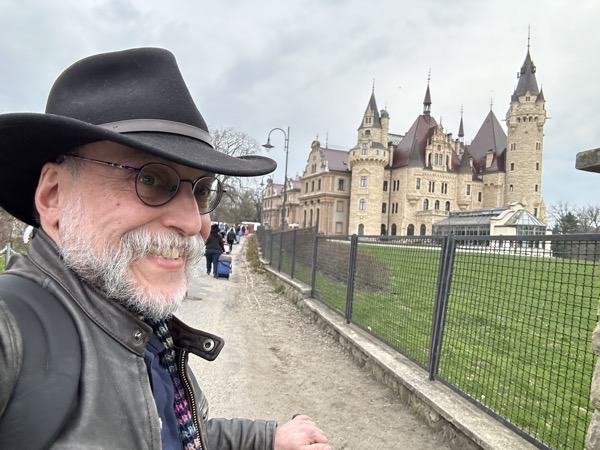 As I write this, I am on a plane returning to Portland after attending the Fairweather Manor LARP held at Moszna Castle in Poland. If you’d like an introduction to the concepts of European-style Live Action Role Playing, please see the Conscience LARP Report I posted last week.
As I write this, I am on a plane returning to Portland after attending the Fairweather Manor LARP held at Moszna Castle in Poland. If you’d like an introduction to the concepts of European-style Live Action Role Playing, please see the Conscience LARP Report I posted last week.
Whereas Conscience was a LARP pretty closely based on Westworld, Fairweather Manor was more loosely based on Edwardian family dramas such as Downton Abbey and Upstairs/Downstairs. A gigantic, sprawling game involving nearly 150 participants, it explored concepts of class, power, romance, and interpersonal politics in Europe in the tumultuous year 1912. Although the LARP took place in a castle in Poland, it was set in a castle in England, where the head of the fictitious Fairweather family had called together all of his friends and relations to celebrate the family’s impending voyage to America on the spectacular new ocean liner HMS Titanic.
The characters of this LARP represented the extended Fairweather clan, including delegations from the English, Irish, French, Belgian, American, and Russian branches; their friends and relations, including bankers, lawyers, townspeople, actors, and artists; and their servants. The relationships and tension between the “upstairs” characters (about 2/3 of the players) and the “downstairs” characters were a major driver of the game’s drama.
And oh what drama there was. Every character had agendas, secrets, and a rich backstory, and the braided intersections of all those stories guaranteed plenty of tears, heartache, scandal, disappointment, betrayal, and joy. Much of the drama involved romance one way or another, in particular the search for a suitable spouse for those of marriageable age, but there was also plenty of drama around money, reputation, status, and art. Fairweather Manor didn’t have a strong overarching plot like Conscience’s “the robots are gaining consciousness” or Meeting of Monarchs’s “Henry VIII wants to divorce his queen and found a new church;” instead, it was a huge pile of subplots which were loosely collected into a three-act structure of “A Blissful Reunion” (characters renew existing relationships and form new ones), “Out with the Old and In with the New” (characters explore and question their place in society), and “Before We Say Goodbye” (characters act on their feelings).
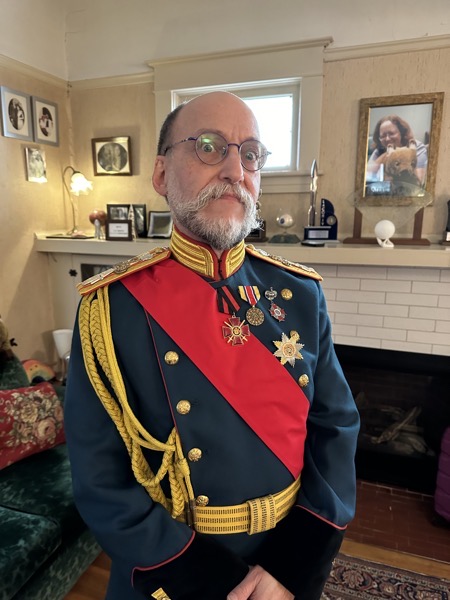 I played Baron Piotr Maximilian Petrov, a powerful and very conservative Russian Baron, a retired captain from the Russian Navy who had suffered a traumatic defeat in the Russo-Japanese War. His wife Baroness Anabelle, sister to the head of the French branch of the Fairweather family, was played by my partner Alisa. She was charming and bubbly and could be counted on to light up any room… possibly by setting it on fire. The Baron and Baroness brought with them their five adult children, one widowed aunt, and three servants. Dimitri, the eldest son and heir, was a dilettante artist who could never seem to finish anything he started. Next in line were twins Arkady and Anatoly; Arkady was a military man with a hot temper, while Anatoly was a bon vivant and a bit of a rascal. Tatiana, the older daughter, was brash and bold and always the center of attention, while Anastasia, the youngest child, was shy and flirty. And aunt Wilhelmina, widow of the Baron’s abusive younger brother, was intelligent and witty and actually rather enjoying being out from under her late husband’s thumb. The two ladies’ maids, also twins as it happens, were dreamy and hopeful Manya Guseva and her more practical sister Dunya, a secret communist. And the Polish valet, Pavel Bakowski, was cold, efficient, and eminently practical. At least, that was how the characters were written. But, as the Baron often said, no plan survives contact with the enemy.
I played Baron Piotr Maximilian Petrov, a powerful and very conservative Russian Baron, a retired captain from the Russian Navy who had suffered a traumatic defeat in the Russo-Japanese War. His wife Baroness Anabelle, sister to the head of the French branch of the Fairweather family, was played by my partner Alisa. She was charming and bubbly and could be counted on to light up any room… possibly by setting it on fire. The Baron and Baroness brought with them their five adult children, one widowed aunt, and three servants. Dimitri, the eldest son and heir, was a dilettante artist who could never seem to finish anything he started. Next in line were twins Arkady and Anatoly; Arkady was a military man with a hot temper, while Anatoly was a bon vivant and a bit of a rascal. Tatiana, the older daughter, was brash and bold and always the center of attention, while Anastasia, the youngest child, was shy and flirty. And aunt Wilhelmina, widow of the Baron’s abusive younger brother, was intelligent and witty and actually rather enjoying being out from under her late husband’s thumb. The two ladies’ maids, also twins as it happens, were dreamy and hopeful Manya Guseva and her more practical sister Dunya, a secret communist. And the Polish valet, Pavel Bakowski, was cold, efficient, and eminently practical. At least, that was how the characters were written. But, as the Baron often said, no plan survives contact with the enemy.
The Baron and Baroness’s primary goal was to find suitable spouses for all five children by the end of the weekend. (The timeline was, of course, artificially compressed by the real-world constraints of the game, but it did raise the stakes quite nicely.) There were also a few secondary goals, including resolving a situation in which a portrait of the Baroness had been paid for but not yet delivered, but almost everything else revolved around the children and their romantic lives. Of course, all negotiations and deals around the courtships had to be handled during and between the manor’s busy social schedule. There were cards and croquet, music and theatre performances, shooting and fencing, and most importantly three meals a day.
Breakfasts were rather informal, being served buffet style, but lunch and dinner were two- and three-course affairs with a seating chart — the guests were shuffled around for each meal and the question of who sat next to whom was subject to considerable debate and negotiation with the Fairweathers and their staff — and were served to the upstairs characters by the downstairs characters. (The food was prepared by the castle’s staff and was excellent.) These meals lasted an hour and a half to two hours and were fabulous opportunities to form relationships, negotiate betrothals and business deals, and engage in witty conversation. The dinner conversations in which the players, an extremely intelligent bunch from all over Europe and the US, improvised discussing the issues of the day (the day being 1912) in character were actually among the most enjoyable parts of the game for me. And just as Conscience had a “sex mechanic” by which players could play their characters having sex without any actual sex occurring, Fairweather Manor had an “etiquette mechanic.” There were just three things to remember: elbows on the table, pointing with silverware, and tucking of the napkin under the chin. Do any of these things to signal “I have poor manners;” avoid them to signal “I have good manners.”
 In addition to having their own lives and agendas, the players of the downstairs characters had real work to do. They rose hours earlier than the upstairs characters; they had to do all the fetching, carrying, obtaining, cleaning, delivering, and any other tasks delegated to them; and they were responsible for dressing the upstairs characters before breakfast and dinner. As we were informed by a historian at the beginning of the game, upper class Edwardians were fundamentally useless — literally incapable of tying their own shoes or opening a window because they had simply never been taught how to do so — and so as upstairs players we were requested to permit the downstairs characters to assist us with every step of donning our rather complicated outfits and arranging our hair. The intimacy of the act also encouraged close relations between the characters, of course, and the dressing hour was critically important to exchanging gossip, information, and plans between upstairs and downstairs. My own valet, Pavel, was absolutely essential to my game, as without him I would not only have been unable to maintain my magnificent double-decker quad-stache but I would have been woefully ignorant of all the rumors and gossip surrounding my family.
In addition to having their own lives and agendas, the players of the downstairs characters had real work to do. They rose hours earlier than the upstairs characters; they had to do all the fetching, carrying, obtaining, cleaning, delivering, and any other tasks delegated to them; and they were responsible for dressing the upstairs characters before breakfast and dinner. As we were informed by a historian at the beginning of the game, upper class Edwardians were fundamentally useless — literally incapable of tying their own shoes or opening a window because they had simply never been taught how to do so — and so as upstairs players we were requested to permit the downstairs characters to assist us with every step of donning our rather complicated outfits and arranging our hair. The intimacy of the act also encouraged close relations between the characters, of course, and the dressing hour was critically important to exchanging gossip, information, and plans between upstairs and downstairs. My own valet, Pavel, was absolutely essential to my game, as without him I would not only have been unable to maintain my magnificent double-decker quad-stache but I would have been woefully ignorant of all the rumors and gossip surrounding my family.
As I mentioned above, no plan survives contact with the enemy, and as it turned out just about none of us Petrovs played our characters exactly as written. Dimitri, who was written as a dilettante artist and poet, was played as a drunkard with a fierce temper. I found him very distant and desultory; I saw him rarely, never got to spend very much time with him, and got little out of him when I did. As such, trying to get the heir married off proved to be one of my biggest frustrations. Arkady, the angry military man, was played as a person on the autism spectrum; he didn’t really understand emotions and had no tolerance for ambiguity. At one point I tried to get him to understand love by using a metaphor of keeping a horse under control, but he came away believing that horsemanship was somehow necessary to romance. Anataoly, the bon vivant, proved to be the child whose judgement I trusted the most, if only he could be persuaded to stop tormenting his brothers. Tatiana, the bold daughter, unfortunately spent much of the game in her room due to day-job issues and so most of her plot was conducted via rumor and innuendo. And Anastasia, the shy one, invented a plot involving a stolen (or perhaps inappropriately gifted) brooch which provided quite a bit of interesting game play. I had expected that most of my game would involve fending off my children’s inappropriate relationships, but as it turned out none of them seemed particularly interested in getting engaged at all, and so their mother and I spent a lot of time trying to find appropriate spouses, pushing them together as best we could, and hoping they would click.
I myself did not play my character as he was written. Baron Petrov was supposed to be a loud and angry man, an extreme conservative devoted to pushing back against modernity, and a man with severe shell shock which he was medicating with vodka. But… I didn’t want to be that person. So I played him as a lot more compassionate. In particular, I kept saying “I don’t want to be like my father and force you to marry someone of my choosing. I want my children to be happy.” At one point Tatiana and I planned out a scene in which she would wear an inappropriate dress to the grand ball and we would have a huge screaming argument on the dance floor, but as the hour drew nearer I found I was reluctant to go there. I was concerned that too much visible drama on my part could jeopardize my children’s developing engagements, but more importantly I wasn’t certain I could even play that scene. As it happened, for a variety of reasons it didn’t come off at all, but I wonder if the game could have been even more interesting for everyone if I’d been willing to engage with my negative emotions. Perhaps at the next LARP I will try wearing the black hat.
At lunch on the second day I found myself seated next to the matriarch of the Wayward family, the American branch of the Fairweathers. She was extremely interested in joining her family’s fortunes with mine — indeed, her daughter Scarlett wore a series of magnificent Russian-style fur hats specifically selected to attract Petrov attention — and together we hatched a plan to hitch my twin sons with her two daughters in a spectacular double wedding. We planned to get the two families together at a picnic to push the unsuspecting young people together.
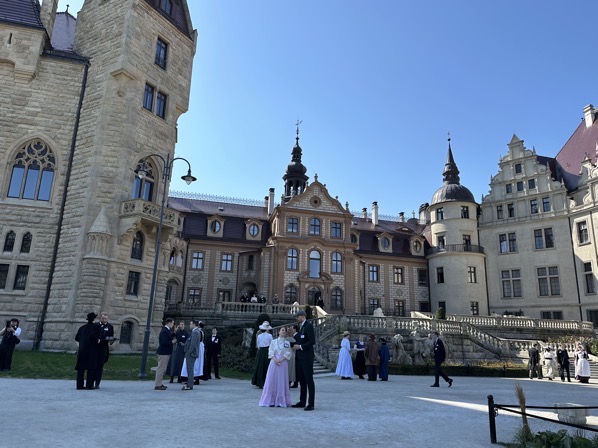 Arranging an event with four people, never mind two entire families, in the sprawling castle and jam-packed schedule was like herding cats. But with the help of the amazing Pavel and the twin ladies’ maids, we actually managed to get almost everyone together for a half-hour tea in the orangery (the weather having turned drizzly). It was delightfully awkward and, wonder of wonders, the four children did indeed go off in pairs at the end of it as we had hoped. But though I had planned to pair the strong-willed Scarlett with angry Arkady and bookish Tiffany with bon vivant Anatoly, the attraction actually ran the other way. Whatever, I thought, as long as they get engaged by the end of the Grand Ball.
Arranging an event with four people, never mind two entire families, in the sprawling castle and jam-packed schedule was like herding cats. But with the help of the amazing Pavel and the twin ladies’ maids, we actually managed to get almost everyone together for a half-hour tea in the orangery (the weather having turned drizzly). It was delightfully awkward and, wonder of wonders, the four children did indeed go off in pairs at the end of it as we had hoped. But though I had planned to pair the strong-willed Scarlett with angry Arkady and bookish Tiffany with bon vivant Anatoly, the attraction actually ran the other way. Whatever, I thought, as long as they get engaged by the end of the Grand Ball.
The Baroness and I did what we could to encourage our surprisingly reluctant children to get engaged. When queried as to their romantic interests, both Anastasia and Dimitri said “that’s your job, dad, just tell me who and I’ll marry them.” But the first candidate we selected for Anastasia — an eminently suitable young man from an excellent family, with whom she was already close friends — was rejected because “it would be too weird.” “This house is full of young people crying because their parents are forcing them to marry someone they hate,” I said, “and you’re saying no to someone because you like him?” But she was intractable, and when she extracted a promise from him to never, ever marry her we had to look for someone else. Dimitri we pointed toward the Fairweathers’ eldest daughter, a bit of an ambitious reach but, given that the Baroness and I had both been seated at the head table on the first night, we thought it was not out of the question. But Dimitri seemed uninterested in actually pursuing her, and according to rumor he was not among her top candidates. Arkady spent time with Tiffany but seemed oblivious to her charms. Tatiana, because she was unavailable for out-of-game reasons, seemed destined for maiden aunthood. And Anatoly… I found that I really liked him, and trusted his judgement, but his dissipated lifestyle seemed to portend a life of happy bachelorhood. So I decided to bribe him.
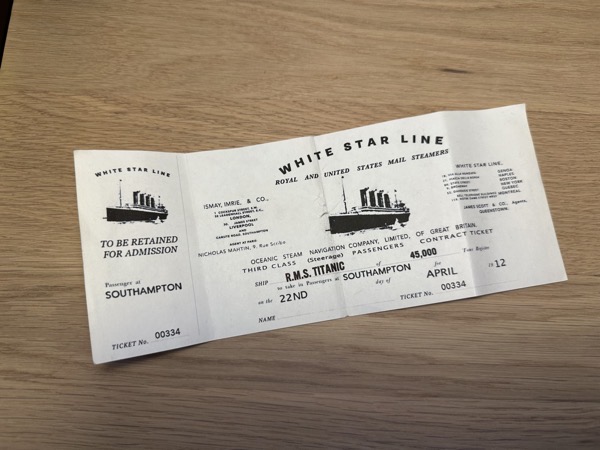 At the beginning of the game we were informed that none of us would have any misgivings whatsoever about the Titanic. A Titanic ticket was a pure boon, one of the most valuable physical items in the game, and we were free to buy, trade, gamble away, or steal them as we wished. Many of the upstairs families, including the Petrovs, had enough money to just buy one from the ticket office, but in order to obtain one we had to go to the organizers’ room and make a case that it would improve the game in some way. So I went there with a plan: I would offer Anatoly two first-class tickets if he became engaged to a suitable young lady by the end of the weekend. The organizers said that this was an excellent plan, commended me for my generous play, and presented me with two tickets forthwith. I showed them to Anatoly and he seemed delighted by the challenge.
At the beginning of the game we were informed that none of us would have any misgivings whatsoever about the Titanic. A Titanic ticket was a pure boon, one of the most valuable physical items in the game, and we were free to buy, trade, gamble away, or steal them as we wished. Many of the upstairs families, including the Petrovs, had enough money to just buy one from the ticket office, but in order to obtain one we had to go to the organizers’ room and make a case that it would improve the game in some way. So I went there with a plan: I would offer Anatoly two first-class tickets if he became engaged to a suitable young lady by the end of the weekend. The organizers said that this was an excellent plan, commended me for my generous play, and presented me with two tickets forthwith. I showed them to Anatoly and he seemed delighted by the challenge.
One other Titanic ticket passed through my hands. As I mentioned earlier, the player of Anastasia had decided on her own initiative to run a subplot involving a diamond brooch, a family heirloom which she had been given by her grandmother at birth. On the second day of the game I was informed by my valet Pavel that Anastasia’s brooch was being flashed around by a no-account layabout artist named Guillaume. And so Pavel, our maid Manya, and I broke into his room to steal it back. But it was not in its accustomed place! I wandered the halls looking for Guillaume, not sure what I would do if I found him… and then I saw him wearing the damn thing on his lapel! Furious, I stalked up to him and demanded its return. “It was a gift from Anastasia,” he replied mildly. “That is family property,” I steamed, “not hers to give away, and if you were a gentleman you would return it to me this moment!” “All right,” he said, and handed it over, along with an incriminating note in Anastasia’s hand saying that it was a gift to express her thanks for extracting her from an extremely compromising situation. That, I thought, was something Anastasia’s mother and I would have to discuss with her later, but after I picked my jaw up off the floor I acknowledged that Guillaume had behaved as a gentleman should and offered him a favor — not an heirloom-brooch-sized favor, but something reasonable — to keep quiet about the whole situation. Later that day I was passed a note requesting a single first-class Titanic ticket. This, I thought, was entirely reasonable, and the organizers agreed, so I presented the ticket to him and we shook hands like gentlemen. (But he was still a no-account layabout artist, and I was secretly glad that he would eventually wind up on the bottom of the Atlantic for his trouble.)
As the clock ticked toward the grand ball which would be the end of the game my life resembled the final act of a Shakespearean comedy. I felt like I was riding a unicycle, balancing a pot of hot tea on my head, and juggling teacups while trying not to spill a drop. Arkady continued clueless, our second choice for Anastasia was hopelessly in love with an actress, Anatoly was keeping his own counsel, Tatiana was hors de combat for out-of-game reasons, and I barely saw Dimitri at all but the halls were abuzz about the Fairweather girl’s impending engagement with an Irish aristocrat. I feared that we would end the game with no engagements at all.
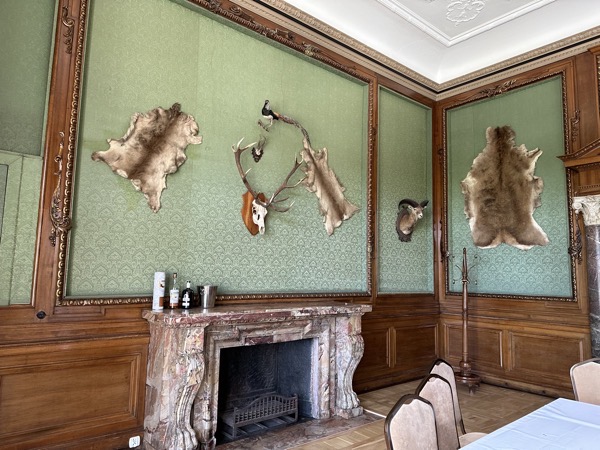 After dinner on the last night — the most lavish and festive meal of the game, with everyone in their very finest outfits — we divided as usual, with the women going to the drawing room and the men to the hunting room (where “I use antlers in all of my decorating”) for brandy and cigars. (The brandy was real, the cigars fake.) There I was drawn aside for a personal question by an American officer, an “aviator” in the newly formed Army Air Corps, with whom I had had several delightful conversations about his novel machine. My heart pounded. He was a commoner without money, but I knew and liked him and his character seemed impeccable, so I agreed to hear him out. He very humbly informed me that he was in love with… our lady’s maid Dunya! He requested that I permit her to depart my service to marry him and move to America. He preempted my biggest objection — that Dunya was Anastasia’s best friend in the world — by saying that he had already spoken to Anastasia and that she consented to the match provided he promised to convert to Russian Orthodoxy and sign a pledge that in case of his untimely death Dunya and any children would return to Russia. The loss of Dunya would be devastating to our family, but I realized I could not stand in the way of true love, so I agreed to grant his request as soon as I heard Anastasia’s consent from her own lips. Well, I thought, at least we’ll get one marriage out of this… though it would mean the loss of one of our most beloved servants, practically a member of the family. We shook hands and I said “oh, by the way, can you suggest anyone as a possible fiancé for Anastasia? Her mother and I are stumped.”
After dinner on the last night — the most lavish and festive meal of the game, with everyone in their very finest outfits — we divided as usual, with the women going to the drawing room and the men to the hunting room (where “I use antlers in all of my decorating”) for brandy and cigars. (The brandy was real, the cigars fake.) There I was drawn aside for a personal question by an American officer, an “aviator” in the newly formed Army Air Corps, with whom I had had several delightful conversations about his novel machine. My heart pounded. He was a commoner without money, but I knew and liked him and his character seemed impeccable, so I agreed to hear him out. He very humbly informed me that he was in love with… our lady’s maid Dunya! He requested that I permit her to depart my service to marry him and move to America. He preempted my biggest objection — that Dunya was Anastasia’s best friend in the world — by saying that he had already spoken to Anastasia and that she consented to the match provided he promised to convert to Russian Orthodoxy and sign a pledge that in case of his untimely death Dunya and any children would return to Russia. The loss of Dunya would be devastating to our family, but I realized I could not stand in the way of true love, so I agreed to grant his request as soon as I heard Anastasia’s consent from her own lips. Well, I thought, at least we’ll get one marriage out of this… though it would mean the loss of one of our most beloved servants, practically a member of the family. We shook hands and I said “oh, by the way, can you suggest anyone as a possible fiancé for Anastasia? Her mother and I are stumped.”
He could, as it happens, and though the young man — a captain in the English army — was barely known to me, he was already a friend of Anastasia’s and the aviator vouched for his character, so I asked him to arrange a meeting between us. Pretty soon the young man in question sought me out and made his case. I queried him as to his intentions and prospects and was satisfied, so I accepted his request. (I did this without consulting the Baroness, as time was growing very short, but I informed her as soon as I could and she agreed with my assessment of the situation.) We discussed how best to approach Anastasia with the news and we agreed that he should be the one to pop the question, without my involvement. One down, I hoped, four to go.
Tick tick tick. The ball had already begun and I was rushing hither and yon. Everywhere you looked men were kneeling before women crying with happiness. The Baroness, because of out-of-game mobility issues, remained seated at the side of the ballroom. Anastasia was beaming in the middle of the room, having just accepted the captain’s proposal, and I congratulated them heartily. Arkady was deep in conversation with Tiffany, that’s good. Anatoly was dancing with an absolutely beautiful specimen, that’s good. Tatiana was socializing cheerfully, that’s acceptable. But where was Dimitri? Drinking alone in the corner. Oh dear. I went to him. “Apparently Amanda prefers an Irish brute to a Russian noble,” he slurred. “But I will show him a thing or two!” I told him as strongly as I could not to do anything rash.
Then Arkady came to me, looking rather stunned. “I do not know what to do, Father,” he said. “I do not understand my own heart.” “Would an order from your father help?” I asked. “Yes.” “Go find that girl and propose to her immediately!” I commanded him. He saluted and went off to find her. But I soon saw him wandering helplessly around the ballroom. “Can I help find her?” I asked. “Yes,” he said, “Her name is Monique Delacour.” What happened to Tiffany? I thought, but once he had described this Monique I told him to remain in the ballroom and I’d try to find her and bring her to him. I did find her, eventually, and brought her back, whereupon they entered into an intimate conversation. I crossed my fingers and backed away.
Anatoly came up to me then, happily presenting his intended, a beautiful young woman named Gabrielle Delacour (cousin, as it happened, to Monique, and both members of the richest family in the game). I immediately gave my assent to the match and presented Anatoly with the tickets. “But,” I warned him, “you are not permitted to tell your brothers until tomorrow morning.” I knew that if his brothers discovered I’d bribed him so handsomely for something I was asking them to do for free they would revolt, but tomorrow of course, would be after the end of the game. Anatoly was disappointed — tormenting his brothers was his greatest joy — but consented. Three down? I thought.
But no — it was only two. Arkady returned to me crestfallen, saying that Monique had already pledged her heart to another. Alas. If only he had not been so hesitant — he’d missed out by less than half an hour. (After the game ended I had a chance to talk with Tiffany’s player to find out what had happened. She had been hoping and expecting for Arkady to pop the question, but he told her “my father ordered me to propose to Monique.” Argh! I had specifically said “that girl” precisely because I was not certain whom he was courting! But what we hear is not always what was intended.)
Then Pavel, my trusted valet, came up to me with a personal matter of some importance. Drawing me aside, he said “I would like your permission to marry Manya. If you grant this request, I promise that we will both serve you faithfully until the end of time.” That was, I assured him, rather more than was necessary, but I was actually overjoyed. The prospect of my two remaining servants, practically family, to not only find happiness with each other but remain with the family as well brought real tears of joy to my eyes. We went down to the servants’ hall, where it would have been unseemly for me to enter, and Pavel went in and brought Manya out. “Congratulations on your betrothal,” I told her happily. “I wholeheartedly consent to your marriage to Pavel.” She immediately burst into tears and fled from the vicinity. “I had not yet informed her of my intent to propose,” Pavel clarified. I felt sick, but as I could not follow her into downstairs space I instructed Pavel to keep me informed of further events.
I returned upstairs to the ball, which was very nearly over. Anastasia and Anatoly were glowing; Arkady was staring into space; Tatiana was cheerfully engaged in conversation. Where was Dimitri? Then I heard shouting, and Dimitri’s name. I pushed through the crowd to find him punching someone, I knew not who. “DIMITRI, STAND DOWN!” I shouted — the only time in the game I raised my voice — and he did. I dragged him into the hall outside the ballroom… and then there was a call for silence, and an announcement I couldn’t make out, followed by applause. Dimitri and I returned to the ballroom to find that the game had just ended. This was followed by a speech by the organizers about how all the people who had been so happy to have gotten Titanic tickets wound up — basically, the first-class women mostly survived and almost everyone else perished. But we all applauded anyway, because it had been a fabulous game. Dimitri and I did a passing-hand-across-face gesture to indicate “okay, dropping character now” and hugged. Final score: two children and one servant happily engaged, two proposals attempted but rejected, one proposal still pending. I’ll take it.
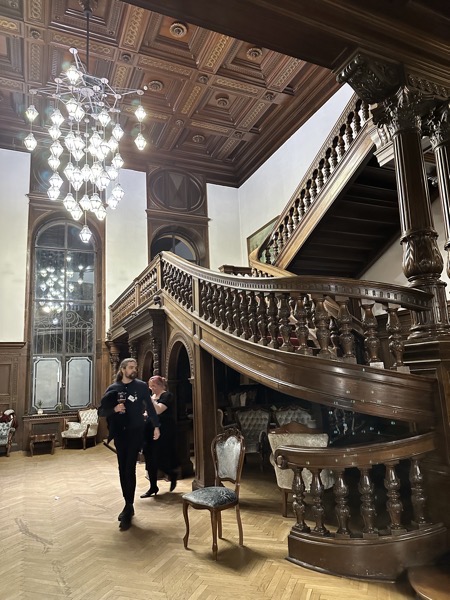 I spent a good hour after the game ended talking with the player of Pavel, who had been extremely emotionally contained and had never broken character once. I had grown to trust Pavel and depend upon him completely and I needed to meet the person behind the character. He turned out to be charming and witty, as I’d expected, but he also revealed something utterly shocking to me: Pavel had been an absolute two-faced bastard, who sucked up to the upstairs characters and was a complete shit to his downstairs peers. But, as Pavel was pretty much my sole line of communication to the downstairs, I had had no idea of any of it. I had played Robert to Pavel’s Thomas, and I felt an utter fool. (This was, perhaps, why Manya had burst into tears at the end. But when I talked with her player later, she said that she had merely been overcome with emotion and that the character would need some time to reach a decision. She honestly didn’t know which way Manya would eventually go.)
I spent a good hour after the game ended talking with the player of Pavel, who had been extremely emotionally contained and had never broken character once. I had grown to trust Pavel and depend upon him completely and I needed to meet the person behind the character. He turned out to be charming and witty, as I’d expected, but he also revealed something utterly shocking to me: Pavel had been an absolute two-faced bastard, who sucked up to the upstairs characters and was a complete shit to his downstairs peers. But, as Pavel was pretty much my sole line of communication to the downstairs, I had had no idea of any of it. I had played Robert to Pavel’s Thomas, and I felt an utter fool. (This was, perhaps, why Manya had burst into tears at the end. But when I talked with her player later, she said that she had merely been overcome with emotion and that the character would need some time to reach a decision. She honestly didn’t know which way Manya would eventually go.)
It really was a fabulous game. The characters, the drama, the richness of the setting and the fabulous costumes, the food — it truly did feel like a weekend spent in another time, another world. With such a large cast I knew that I had experienced only a tiny fraction of even the upstairs characters’ stories — never mind the downstairs characters’, of which I had essentially zero knowledge — but my part of it felt full and complete. All in all I have to say that I preferred Conscience and Meeting of Monarchs because they had an overarching plot rather than just character interactions (they were miniseries rather than a soap opera, so to speak), but the character interactions at Fairweather were so great that it was a rich and emotionally satisfying experience.
Would I do it again? Heck yeah! Many of the players had done two or three runs of Fairweather in the past, and I can see why — playing any other character, especially a downstairs or commoner character, would produce a completely different game. Perhaps if I do it again I will play my dark side in a way I did not allow myself to do this time. But do I really want to? I’m not sure, but I’m sure that if I did it would be interesting.
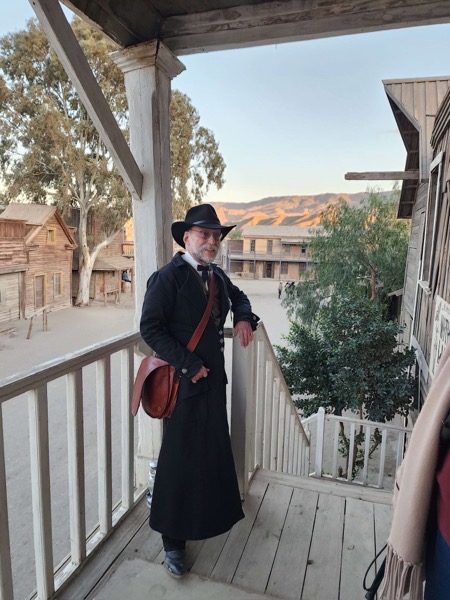 Last weekend I attended run 6 of
Last weekend I attended run 6 of 
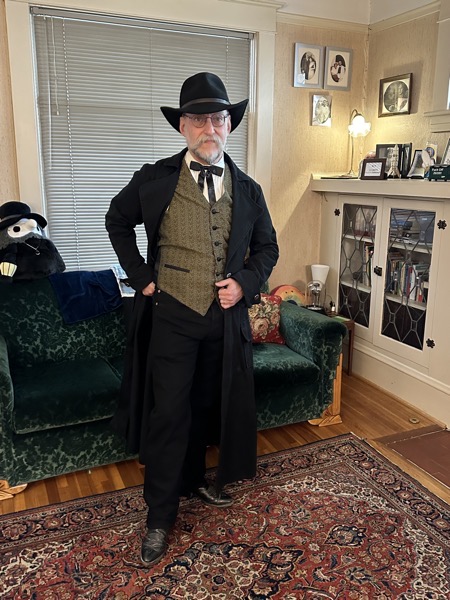
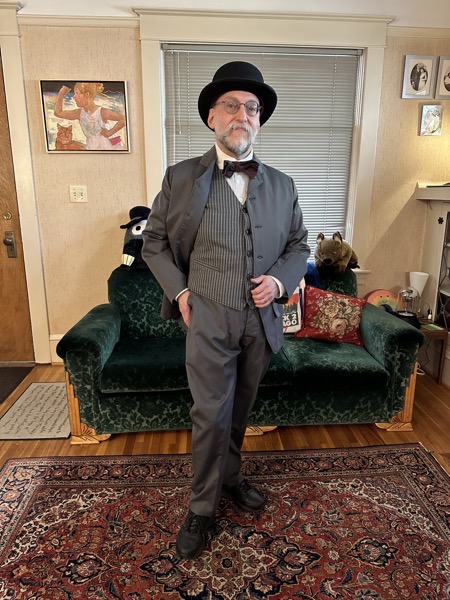
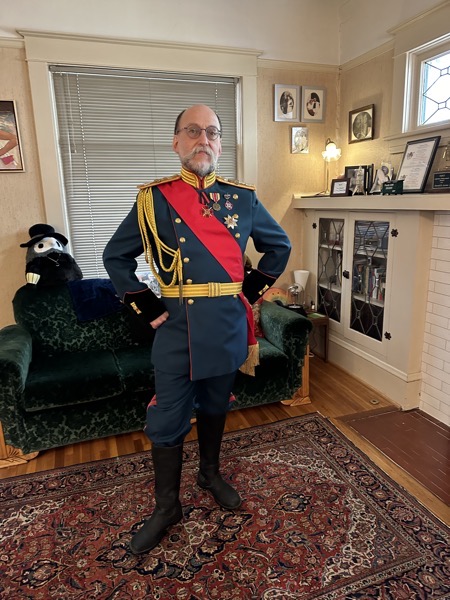
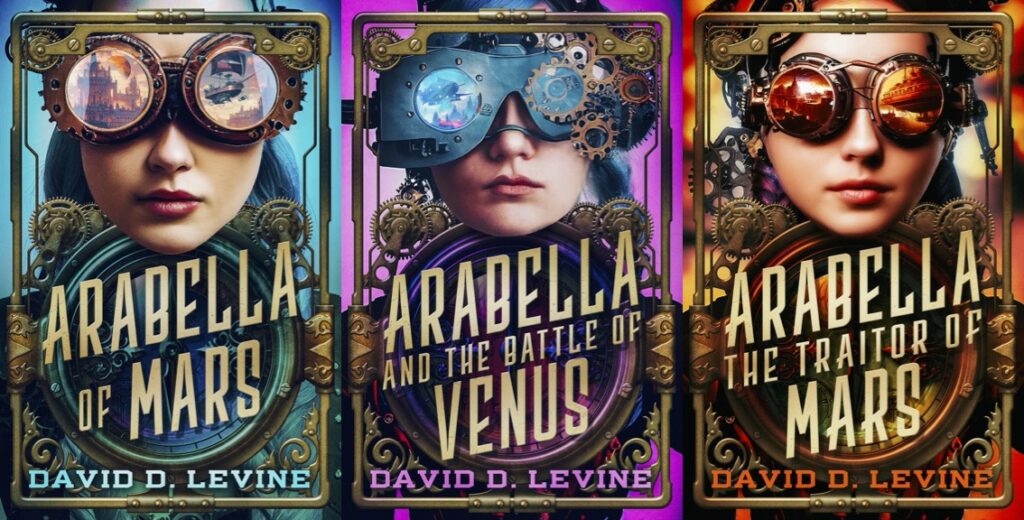
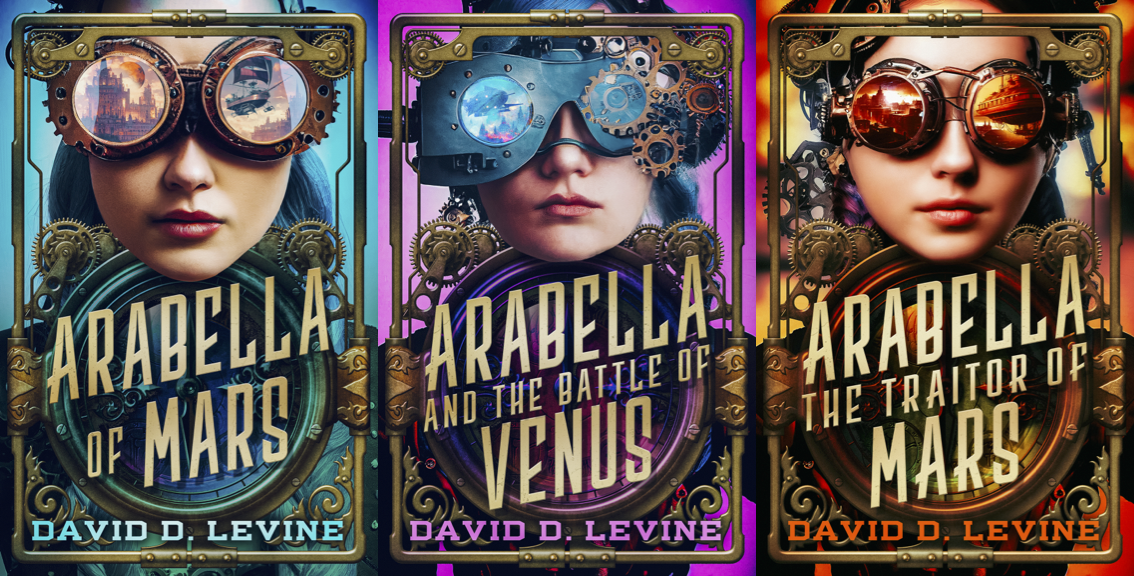
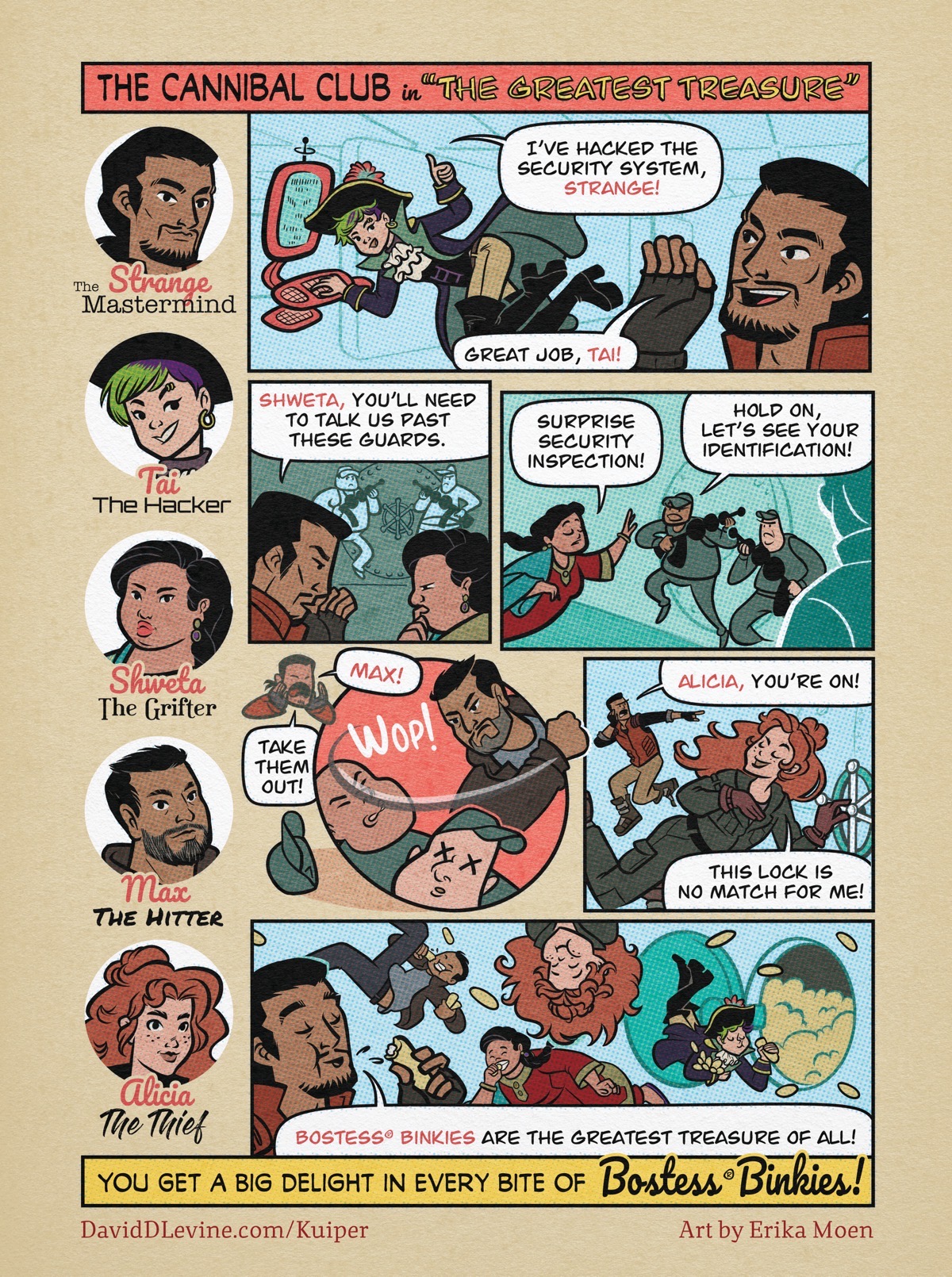
Recent Comments